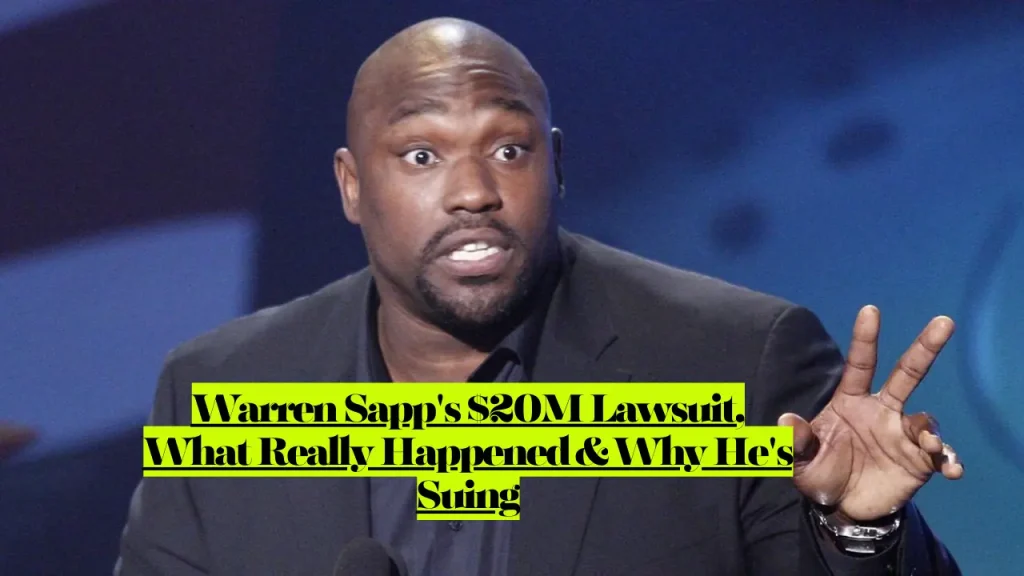Warren Sapp’s $20M Lawsuit, What Really Happened & Why He’s Suing
NFL Hall of Famer Warren Sapp is suing the Okeechobee County Sheriff’s Office for $20 million after what he calls a wrongful arrest during a charity event in February 2024.
Here’s everything you need to know about the Warren Sapp lawsuit.
What Happened to Warren Sapp?
On February 24, 2024, Sapp was participating in a charity convoy from Miami when deputies pulled him over in Okeechobee County, Florida. He was arrested and charged with obstruction without violence.
The problem? All charges were later dropped by the state attorney.
Now Sapp claims deputies violated his civil rights during the arrest and detention.
Table of Contents
Why Is Warren Sapp Suing for $20 Million?
Sapp filed the lawsuit claiming deputies:
- Falsely arrested him without cause
- Illegally detained him
- Violated his constitutional rights
- Caused emotional distress and public humiliation
The $20 million covers damages for his reputation, emotional trauma, and the violation of his civil rights.
What Are His Chances of Winning?
Pretty good, actually. Here’s why:
The charges were dropped – This suggests the original arrest lacked merit.
Sheriff’s office admits mistakes – Officials have acknowledged “several things” could have been handled differently.
Clear timeline of events – The charity convoy provides context that supports his version.
Recent Updates on the Case
In April 2025, Sapp appeared at a county commission meeting where he spoke about filing the $20 million claim. The sheriff’s office has publicly acknowledged procedural errors in his arrest.
Sapp also detailed his experience on “Thee Pregame Podcast,” giving his first full account of what happened.
Related Lawsuit: Volcano Bay Lawsuit, Universal Orlando Faces $50 Million Brain Bleed Claim Over Bathroom Slip Incident

How Civil Rights Lawsuits Work
When police violate someone’s constitutional rights, you can sue under federal civil rights law (Section 1983). You need to prove:
- Police acted improperly
- Your rights were violated
- You suffered damages
Settlements typically range from thousands to millions, depending on the case severity.
What Happens Next?
The case will likely follow this path:
Settlement talks – Most cases settle out of court to avoid bad publicity.
If no settlement – The case goes to trial, which could take 1-3 years.
Evidence gathering – Both sides collect documents, witness statements, and expert testimony.
Key Questions About the Warren Sapp Lawsuit
Will Sapp actually get $20 million?
Probably not the full amount. Most civil rights cases settle for much less than the initial demand. But the dropped charges and sheriff’s admission strengthen his position.
How long will this take?
Civil rights cases typically take 1-3 years to resolve. High-profile cases sometimes settle faster.
What does this mean for other people?
If Sapp wins, it could make police departments more careful about arrests and encourage others to file similar lawsuits.
Why This Case Matters
This isn’t just about Warren Sapp – it’s about police accountability. When law enforcement admits mistakes and charges get dropped, it raises serious questions about the original arrest.
The case also shows that being famous doesn’t protect you from police misconduct, but it might help you fight back with better legal resources.
Bottom Line
Warren Sapp’s $20 million lawsuit has strong foundations: dropped charges, admitted police errors, and clear civil rights violations. While he may not get the full $20 million, the case highlights important issues about police conduct and accountability.
The sheriff’s office acknowledgment that they could have handled things differently is a significant admission that strengthens Sapp’s position considerably.
Stay updated on the Warren Sapp lawsuit and other major legal cases by following our coverage of civil rights and police misconduct litigation.
About the Author

Sarah Klein, JD, is a licensed attorney and legal content strategist with over 12 years of experience across civil, criminal, family, and regulatory law. At All About Lawyer, she covers a wide range of legal topics — from high-profile lawsuits and courtroom stories to state traffic laws and everyday legal questions — all with a focus on accuracy, clarity, and public understanding.
Her writing blends real legal insight with plain-English explanations, helping readers stay informed and legally aware.
Read more about Sarah
